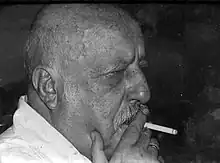Francisco Tobar Garcia | |
|---|---|
 | |
| Born | November 3, 1928 Quito, Ecuador |
| Died | February 1, 1997 (aged 68) Guayaquil, Ecuador |
| Occupation | Writer, Diplomat |
| Nationality | Ecuadorian |
Francisco Tobar Garcia (Quito, November 3, 1928 – Quito, February 1, 1997) was an Ecuadorian poet, playwright, short story writer, essayist, journalist, literary critic, diplomat and university professor.[1]
He held a Ph.D. in Literature from the Pontifical Catholic University of Ecuador. He was a visiting professor at the National University of La Plata in Argentina, the Sorbonne in Paris, and the Complutense University of Madrid. He functioned as a diplomat for the Ecuadorian government in Spain, Haiti and Venezuela. He was also the director of the publishing division of the House of Ecuadorian Culture.[2]
He died of lung cancer on February 1, 1997.[3]
Works
Poetry
- Amargo (Quito: Ed. Presencia, 1951)
- Segismundo y Zalatiel (Quito: Ed. Presencia, 1952)
- Naufragio y otros poemas (Quito: Ed. Casa de la Cultura, 1962)
- Dhanu (Madrid: Oficina de Educación Iberoamericana, 1978)
- Ebrio de eternidad (Quito: Ed. Banco Central de Ecuador, 1992)
Plays
- Tres piezas de teatro (Quito: Ed. Casa de la Cultura, 1962)
- Grandes comedias (Quito: Ed. Casa de la Cultura, 1981)
Novels
- Pares o nones (Madrid: Ed. Planeta, 1979) - winner of the Marbella Prize in Spain
- La corriente era libre (Bogotá: Ed. Paulinas, 1979)
- Autobiografía admirable de mi tía Eduvigis (Quito: Ed. El Conejo, 1991) - considered Francisco Tobar Garcia's masterpiece by critics
Short stories
- Los quiteños (Quito: Ed. Central de Publicaciones, 1991)
References
This article is issued from Wikipedia. The text is licensed under Creative Commons - Attribution - Sharealike. Additional terms may apply for the media files.